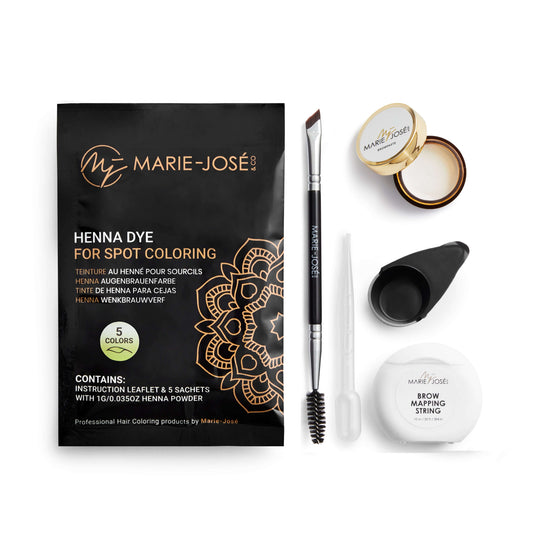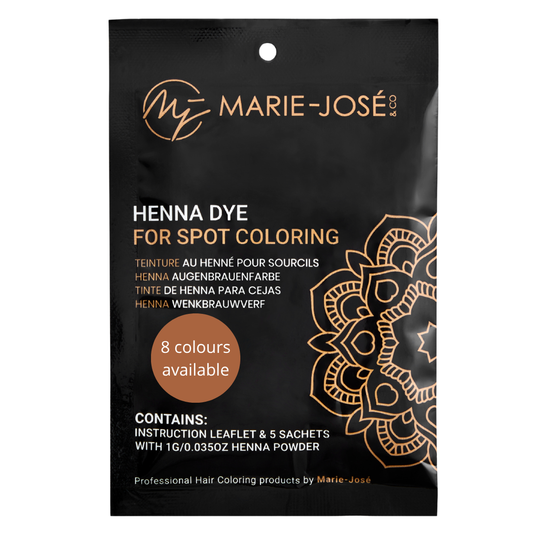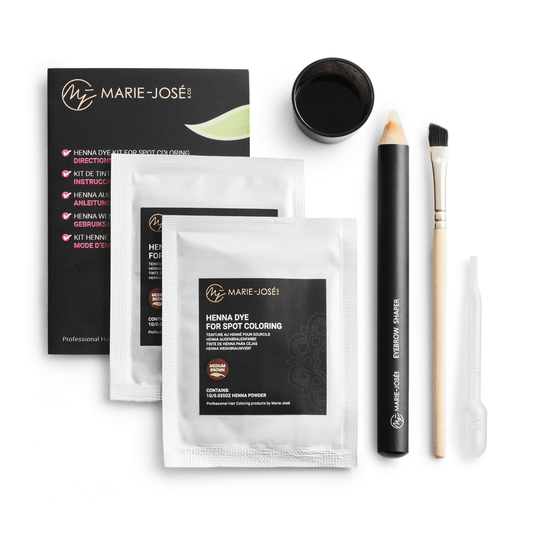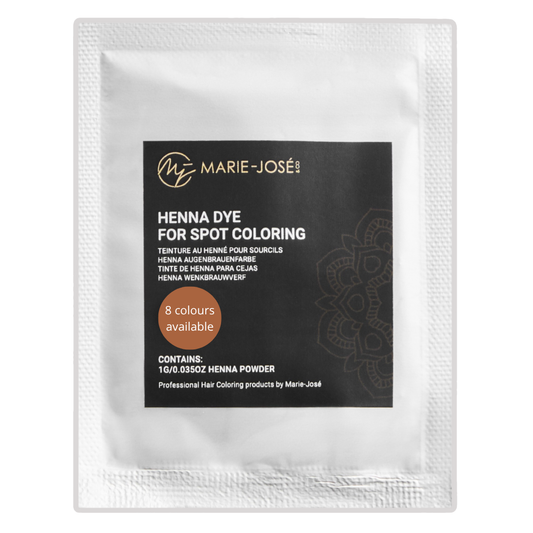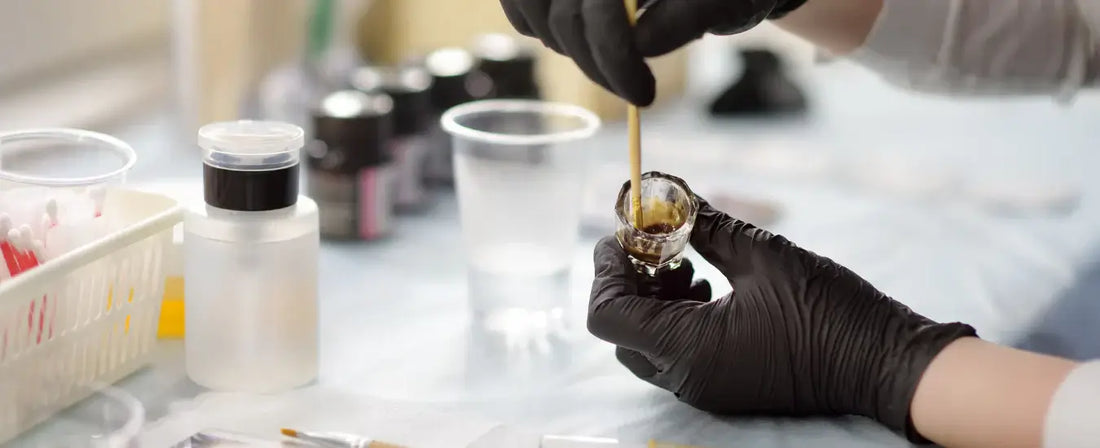
The Art of mixing Eyebrow Henna Colors
Share
Being a true henna brow artist involves not only precision in application, but also a deep understanding of color mixing to tailor every client’s needs. With eight distinct henna colors the possibilities of creating the perfect eyebrow tint for each customer are endless. Let us guide you through the art of mixing henna colors to achieve the ideal blend for your client’s.
Understanding the various natural shades of our henna dye
- Blonde; Ideal for the lightest skin tones and hair colors, providing a subtle tint. There is no lighter shade, so the lightness of the pigment will depend strictly on the amount of time left on the skin and hair. If you want a lighter shade, leave it on for a shorter time. Keep in mind that the color can become warmer or cooler based on the client’s skin tone. Add a little Light Brown to achieve a dark blonde effect. To make the Blonde shade warmer you can add a pinch of Chestnut Brown.
- Grey Brown; Designed for cooler tones, perfect for silver or ash-colored hair. Perfect mixing color, adding a pinch of Grey Brown to Light or Dark Brown makes these colors a bit cooler and a pinch of Grey Brown gives a warm effect added to Blond or Medium Brown.
- Light Brown; This is the ideal color for blondes and brunettes or people with light skin tones. This color is also highly recommended for blondes who like ashy brows. For a cooler and darker tint add a little Grey Brown. Light Brown is also a perfect color to soften up the darker colors.
- Copper Brown; This Natural color is ideal for redheads or to mix with Blonde and Brown shades to make those colors warmer. This color leaves a nice warm reddish-brown color on the eyebrows. We always recommend mixing it with another color to create a more intense look.
- Medium Brown; A balanced Brown that works well for most Brunette tones. A great match for Mediterranean skin types who don’t want super dark defined brows. It can give a nice neutral Brown shade that is also perfect for olive toned skin types. Mixing with other colors is mostly not needed. If you want a little more intensity you can add a pinch of Grey Brown.
- Chestnut Brown; Has warm, reddish undertones, suitable for vibrant Brunette shades. You can add a pinch of Chestnut Brown to any color you want to make it warmer.
- Dark Brown; Is a rich chocolatey shade that goes perfectly with dark hair colors. You can also easily mix this with the Black henna to create bold eyebrows. Adding depth without the starkness of Black.
- Black; Our darkest and most intense shade is suitable for medium to dark skin tones and black hair. You can mix this color with Light or Medium Brown to create a more ashy color. Keep in mind that this color can turn out very dark. You can use the Black henna to make any other color a bit more intense, but beware, just use a very very little pinch because it easily gets too dark.

Start with a consultation and find the right henna tone
Each client is unique. Understand their preferences, natural hair color, and desired look. Consider their hair and skin tone to select the base color. Our Henna colors can be divided in three categories;
- Base colors; Black, Dark Brown, Medium Brown and Light Brown
- Warm Tones; Copper Brown, Chestnut Brown
- Cool Tones; Grey Brown, Blond
Mixing henna is like painting; start with a base color and add secondary shades to achieve the desired tone.
Learn here is how your can mix different henna colors;
- For Natural Look; Mix primary colors like Medium or Light Brown with touches of Blonde or Grey Brown. This softens the intensity and is perfect for achieving a look that’s both subtle and defined.
- For Rich Dept; Add a small amount of Black to Dark Brown to deepen the tone, ideal for dramatic and bold eyebrows.
- For Warmth; Enhance your base color with Chestnut of Copper Brown to add warmth and vibrancy, particularly flattering for warmer skin tones.
- For Cooler Tones; Achieve ashier tones by blending Grey Brown or Blond with Light or Medium Brown, suitable for those with cooler skin undertones.

Practical Tips for blending Henna Tint
- Test your mix on a small patch of skin or paper to preview the color. Adjust your mixture as needed.
- Write down the mixing ratio for your customer so she can be sure the result will be the same next time.
- Limit your mixes to two colors to avoid unnecessary complexity. Often two shades are sufficient to create a perfect blend.
- Use just a pinch of your mixing color to avoid overpowering the base color. The most common mixing ratio is 90/10 for each henna color.
- Remember the application time also affects the final color outcome. For lighter shades, a shorter duration is recommended, while longer times will intensify the color. The skin’s undertone can also influence the result, making the color appear warmer or cooler.
- Keep in mind that you cannot lighten up brow hairs using brow henna.
- If your client has a lot of brow hairs, the henna color will usually turn out darker. This is because henna dyes both the skin and the hair. If your client has few eyebrow hairs and the shape of the eyebrow contains many gaps, there is a greater chance that the henna dye will be less dark on the skin. In this case, you have to pay extra attention for the henna to cover the skin thoroughly.
- For choosing the right color it is essential to look at the eyebrow hair structure as well. If your client has stiff eyebrow hairs, the henna dye will soak in quickly and there is a chance that the color will become too dark in a short time.

